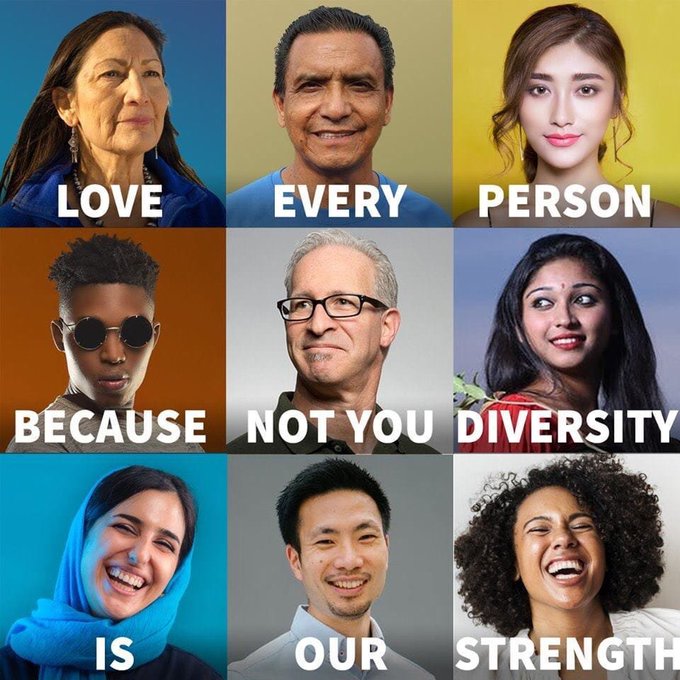Difference between revisions of "Identity politics"
| (36 intermediate revisions by the same user not shown) | |||
| Line 1: | Line 1: | ||
| + | [[File:FwIH4dJaAAAaC4V.jpeg|thumb|Meme showing how identity politics is inherently exclusionary.]] |
||
| ⚫ | |||
| + | [[Identity politics]], or more recently '''idpol''', is an ideology in which people are categorised on the basis of characteristics that are often readily identifiable. Characteristics often include [[gender]], race, [[gender identity]] or [[sexuality]]. While identity politics often uses terminology such as [[diversity]] it is really talking about a coarse form of diversity based on physical characteristics and ignores important forms of diversity such as ''diversity of thought''. |
||
| − | It's become very popular lately to reject 'labels' but the truth is that group identity is one of the most powerful tools that we as a species have. Human societies were built on group identity long before the written word. Yes, even free thinkers can identify with a group. The use of the term group identity still doesn't imply identity politics. |
||
| ⚫ | One of the greatest misunderstandings about the men's rights movement and anti-feminism is that they in any way involve identity politics. Merely seeking to address the problems faced by a particular group does not imply acceptance or endorsement of identity politics. In contrast, [[Feminism]] is increasingly tied to identity politics and [[post modernism]]. |
||
| − | The key difference is that identity politics involves grouping on the basis of certain characteristics with which people identify. These characteristics tend to be related to a person's background or origins. Identity politics is at its heard exclusionary. |
||
| ⚫ | |||
| ⚫ | |||
| + | <blockquote> |
||
| ⚫ | |||
| ⚫ | |||
| + | <ref>https://www.lexico.com/definition/identity_politics</ref> |
||
| + | </blockquote> |
||
| + | Identity politics is inherently exclusionary and intolerant even as it uses the language of inclusion and tolerance. It is inherently unkind even as it claims to be kind. |
||
| ⚫ | |||
| ⚫ | The [[men's rights]] movement accepts anyone who wants to help us regardless of their gender, ethnicity, sexuality or any other characteristic they might have. Every major men's rights organisation has had women in leadership roles. This is because those women were willing and able to fill those positions. Anyone who wants to help [[MRA]]s address the problems facing men and boys is welcome. |
||
| − | <pre> |
||
| + | |||
| ⚫ | |||
| ⚫ | |||
| − | </pre> |
||
| + | |||
| + | == See Also == |
||
| + | |||
| + | *[[Political correctness]] |
||
| + | *[[Woke]] |
||
| + | |||
| + | == External Links == |
||
| + | |||
| + | *[https://www.city-journal.org/seattle-interrupting-whiteness-training City Journal]<ref>https://archive.is/guDqp</ref> |
||
| + | |||
| + | == References == |
||
| + | |||
| + | [[Category:Featured Articles]] |
||
| + | [[Category:Identity Politics]] |
||
| + | [[Category:Glossary]] |
||
Latest revision as of 12:55, 12 March 2024
Identity politics, or more recently idpol, is an ideology in which people are categorised on the basis of characteristics that are often readily identifiable. Characteristics often include gender, race, gender identity or sexuality. While identity politics often uses terminology such as diversity it is really talking about a coarse form of diversity based on physical characteristics and ignores important forms of diversity such as diversity of thought.
One of the greatest misunderstandings about the men's rights movement and anti-feminism is that they in any way involve identity politics. Merely seeking to address the problems faced by a particular group does not imply acceptance or endorsement of identity politics. In contrast, Feminism is increasingly tied to identity politics and post modernism.
The Oxford Dictionary defines identity politics as:
A tendency for people of a particular religion, race, social background, etc., to form exclusive political alliances, moving away from traditional broad-based party politics. [1]
Identity politics is inherently exclusionary and intolerant even as it uses the language of inclusion and tolerance. It is inherently unkind even as it claims to be kind.
The men's rights movement accepts anyone who wants to help us regardless of their gender, ethnicity, sexuality or any other characteristic they might have. Every major men's rights organisation has had women in leadership roles. This is because those women were willing and able to fill those positions. Anyone who wants to help MRAs address the problems facing men and boys is welcome.
Compare to feminist groups. Many exclude men from leadership roles and some exclude men entirely - calling them 'allies'. Some don't even want male allies. That's identity politics.
